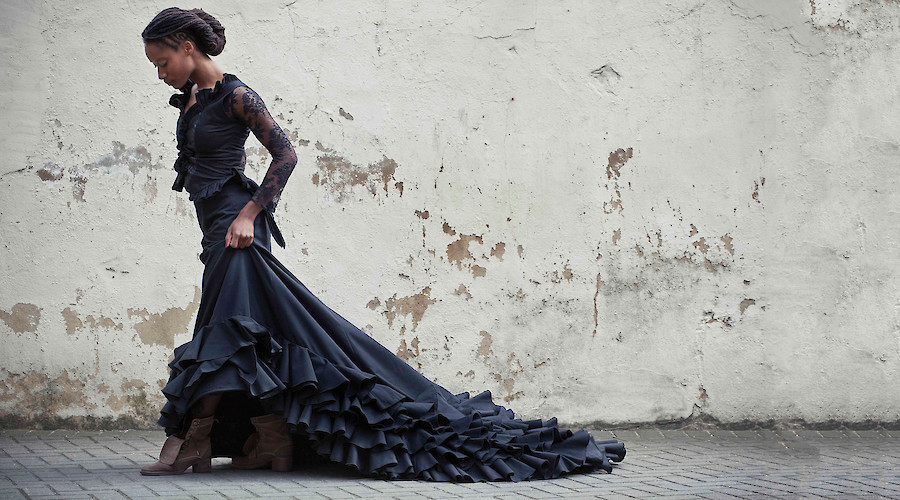The body questions: Celebrating the roots of Flamenco

This two-day international festival and conference explores Flamenco as an embodiment of narratives of otherness.
This interdisciplinary series of events, free and open to the public, fosters dialogue between scholars, Flamenco artists, and audiences about Flamenco as a diasporic and migratory art. The aim is to articulate the work of dance in transmitting culture —including ideas about race— and to broaden understanding of the historical and political forces driving these processes.
Marking the release of K. Meira Goldberg’s monograph Sonidos Negros: On the Blackness of Flamenco (Oxford University Press, fall 2018), The Body Questions presents research and experimentation that foregrounds the power of the body to question, to disrupt outmoded discourses of “authenticity,” and to work instead to relocate Flamenco within a vibrant intersection of art as a celebration of diversity and agency against racism. The program seeks to identify, deconstruct, reflect on, debate, and ultimately reformulate our understanding of Spain’s impact on slavery, of dance as questioning and disrupting racism, and of flamenco as an Africanist art form.
Academic conference
- On October 16, 2018.
- At the Foundation for Iberian Music, CUNY Graduate Center, 365 5th Ave, New York, NY 10016.
From pre-modern Christmas pageants all the way through to Jordan Peele’s “sunken place” —a place where, as Simone de Beauvoir has written, the subjectivity of “sovereign and unique” beings “is crushed by the dark weight of other things,” Whiteness and Blackness have been conjoined in a series of negative correlations. Purity and pollution, harmony and dissonance, over and under, order and disorder, Christian epiphany and damning confusion have limned the edge distinguishing freedom and personhood from enslavement and abjection. Yet in these paradigmatic dyads one term always implies —indeed, defines— the other; in these relations there is never erasure, but rather evidence of white culture’s perverse fascination —envy, even— with the sonorous, dislocated, inciting, and infinitely suggestive products of black culture. We seek in this gathering to attend to flamenco’s cacophony, dissonance, and disorder as vibrating with a fugitive, turbulent Otherness, hinting at the specters of alternate social, spiritual, and aesthetic universes.
Performance Festival
- On October 17, 2018.
- At the Fashion Institute of Technology, 227 W 27th St, New York, NY 10001.
It features a screening of Miguel Ángel Rosales’s powerful documentary film, Gurumbé: Canciones de tu memoria negra (2016), telling the little-known story of slavery in Spain, along with a performance by Yinka Esi Graves, whose emergence onto the international stage is disrupting the “color barrier” in Flamenco, and a conversation between Rosales, Graves, and renowned dance historian Dr. Brenda Dixon Gottschild (Digging the Africanist Presence in American Performance, 1996).
Two additional concerts showcase a diverse group of black and brown flamenco dancers, whose work challenges us to see Flamenco in a new light:
- John Amira, master percussionist in a number of Cuban and Haitian traditions, presents a lecture/demonstration on overlaps and coincidences between Flamenco and Afro-Caribbean rhythms.
- Aliesha Bryan, who won First Place in the 2016 Flamenco Certamen USA and is developing a performing career in both the United States and Spain, presents new work.
- Kevin LaMarr Jones, director of Claves Unidos, presents an experience for participants to discover, share, and celebrate the historical and social connections of African dance.
- Niurca Marquez, a Latinx Flamenco artist questioning colonization and its effect on the body and psyche, whose experimental work with her group Nu Flamenco ranges from fusion with other forms such as hip hop to radically surreal and experimental dance theater.
- Justice Miles, an MFA student in the flamenco program at University of New Mexico, presenting excerpts from her work, Ink on Cotton.
- Arielle Rosales, a Mexican-American Jewish Boricua New Yorker whose unruly explorations are on the cutting edge of Flamenco experimentation.
- Nelida Tirado, a New York-based Flamenco dancer who, among other accolades, was selected as one of Dance Magazine’s 2007 “25 To Watch,” presents excerpts of her work Dime Quien Soy, a meditation on the entanglements of her Puerto Rican and Spanish Flamenco dance lineage.